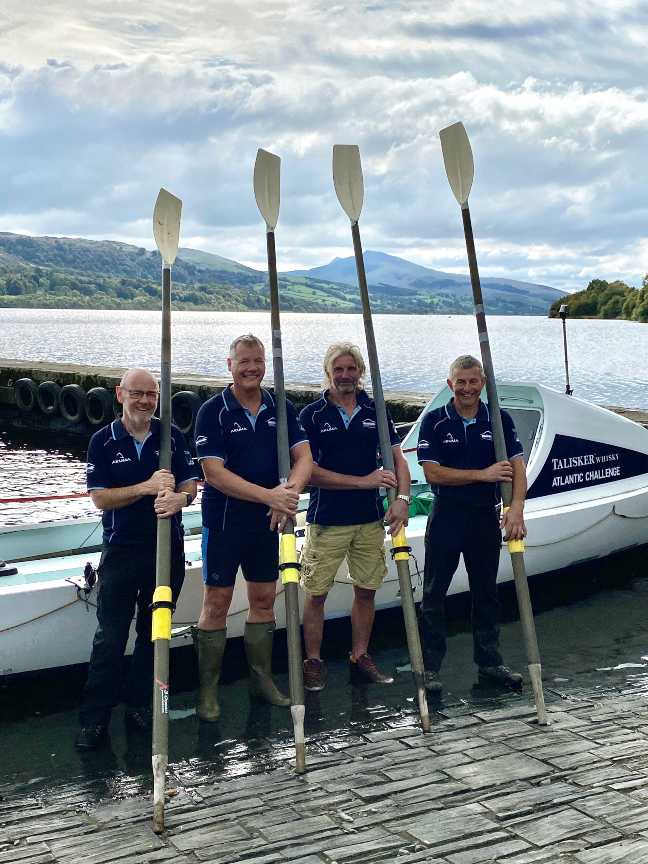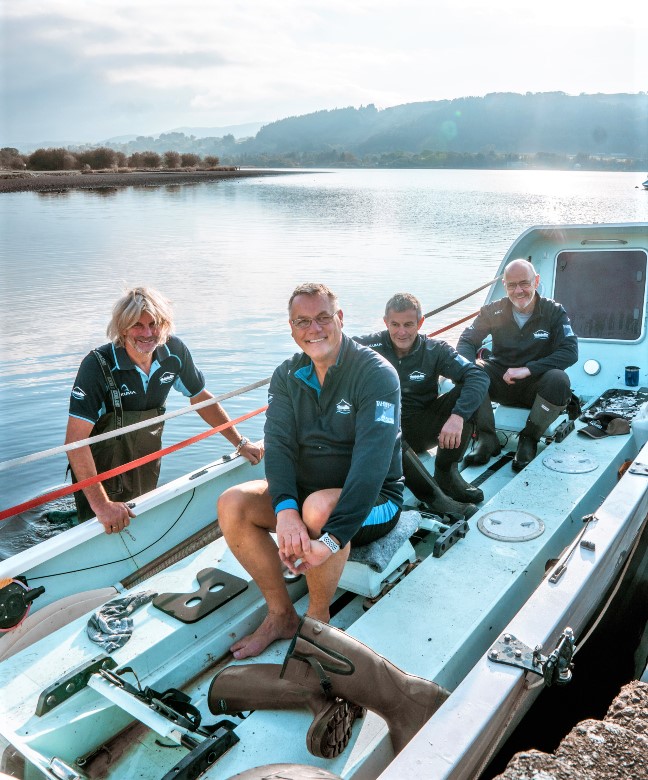Four rowers from Shropshire are training for the Talisker Whisky Atlantic Challenge later this year. Catherine Larner finds out more
They’re probably as far away from the sea as they can be and their experience of rowing has largely been in a gym, or as scratch crews in the Celtic fixed-seat, sweep oar longboat, but four men from Shropshire have set their hearts on rowing the Atlantic.
They’re all in their sixth decade, one of them is partially sighted, another only recently took up rowing to make up the numbers and they signed up to undertake the Talisker Whisky Atlantic Challenge 2021 in the midst of a global pandemic.
It meant delivery of their boat was delayed, courses for the qualifications required by the race organisers have been repeatedly postponed and they have had only rare occasions in between lockdowns to meet and train together.
“We’re stubborn fools really,” says their skipper Stuart Shepherd (Skip). “But why would we give up because we had a few challenges to overcome?”
Calling themselves the Wrekin Rowers after the Shropshire hill which is their local landmark, their commitment and determination is clear.
“To succeed, it’s going to be as a team,” says 57-year-old Skip. “We have known each other for a lot of years. We know our strengths, now we’re learning about our weaknesses and having some frank conversations about how we’re going to support each other.”

THE WREKIN ROWERS PICTURED AT BALA LAKE – LEFT TO RIGHT: MARTIN, STUART, GARY AND RICHARD
“I don’t want to do it just for myself,” says Martin Skeehan, aged 60. “I want to make it happen for these other three. And I know that’s the way they feel about it as well.”
They all met through indoor rowing, each week taking part in the crew classes organised at a local fitness and indoor rowing club, Gym Mostyn. Here, in pre-pandemic times, 22 rowers trained at the same time in one room to music.
“Everybody is set their own rate,” says Skip, who is now a qualified instructor. “You get on a rower and it’s a whole new chapter of injury-free competitiveness. You can be part of a team, but you can work as an individual.”
Each one of the Wrekin Rowers had enjoyed sport, but needed a new passion. Skip was running a demanding business and could no longer compete in squash. Martin, an optometrist, had found exercise was an outlet for his grief after a family bereavement and ultimately saw indoor rowing championships as welcome challenges, winning medals in the World, Irish and English competitions.
Stuart Richards,52, who runs a family building business with brother Gary ,56, had lost his sight in his early twenties and needed an activity which didn’t require eye-ball coordination. He enjoyed walking, cycling and mountaineering challenges with Gary, achieving the Three Peaks and an ascent of Kilimanjaro among many adventures. Indoor rowing allowed him to compete with others on a level playing field. “That’s what got me hooked,” he says. “Straightaway, I felt comfortable indoor rowing.”
After some 10 years in the gym, they made the transition to the water on the invitation of a member of the Shropshire Adventure Rowing Club (SARC). A crew, keen to take part in the Celtic Challenge, rowing across the Irish Sea, was one short. Skip volunteered to take part in 2014 and has since gradually involved the others. “I knew they’d enjoy it,” he says.
Getting on the water involves a 10-mile drive to Shrewsbury where SARC has its boathouse at the town’s showground. Crews and boats are selected at random and then launched on the Severn, a challenging, tidal river. It can mean walking 15 metres down the slipway at low tide, but at full flood the boat will often pass over the top of a fence, between the branches of trees.
“I had all the fitness and rhythm that indoor rowing gives you and joined other more experienced people in the boat. It was a seamless transition”
The club’s Celtic longboats have a long history in Welsh coastal rowing, but SARC members have also rowed further afield, in addition to the Celtic Challenge and London’s Great River Race. Achievements include rowing the length of the Amazon, and several people have also rowed the Atlantic.
“SARC is not like a normal rowing club,” says Skip. “It’s a very eclectic group of much older people who are out to have fun and undertake competitive challenges. And they’re very welcoming. Rowing generally is a fantastic society of like-minded people who want you to do well and want to help.”
All the Wrekin Rowers have discovered the therapeutic effects of rowing. After a hard day at work, stepping into the boat and finding the rhythm means that within a few minutes the day’s frustrations soon disappear, says Skip. “It’s fantastic, a great, great feeling.”
“As soon as I got into the boat, I thought why have I not been doing this before?” says Stuart. “I had all the fitness and rhythm that indoor rowing gives you and joined other more experienced people in the boat. It was a seamless transition.”
“It may seem impossible, but break it down and take the first step, and then the next one”
And it was Stuart who first broached the idea of the Atlantic challenge. “I have done quite a few different challenges. I like the isolation and taking life back to basics. The experience makes you recognise the things which are most important.”
“We all admire the indomitable nature of Stuart,” says Martin, acknowledging that despite his lack of vision, nothing holds him back. “He - and Gary - just keep going steady. They’re our engine room of stability.”
Unfortunately, due to the lockdown restrictions, there hasn’t been much opportunity to get on the water in the past year. They hope, when allowed, to get sculling tuition from nearby Pengwern Boat Club, and will travel to Porthmadog Rowing Club for sea practice.
They drove to Bala Lake in Wales to try the boat, a Rannoch R45, which they purchased from two members of SARC who completed the 2019 crossing as the Atlantic Mavericks. “The race became a reality when we had delivery of the boat,” says Gary. They’ve called it Noah SARC and were reassured by how comfortable it was to row, albeit on glass-like water.

FIRST SESSION ON BOARD!
But it is currently stored in a farmer’s barn and they are having to make do with Zoom training sessions on the ergs. Nevertheless, simulating the shifts of rowing through the night, with limited recovery periods, has been an eye-opener.
“It’s been quite frightening!” says Skip. “You realise how hard it’s going to be to maintain consistency and also how difficult it is in the early morning pieces at 2 or 3am.”
In addition to land-based training, they have focused their efforts on planning and fundraising. They hope to achieve £100,000 for the Royal National Institute of Blind People (RNIB) and the Severn Hospice, both charities which mean a great deal to all the men.
“I think we’ve all got the attitude that nothing’s unachievable; we will make it happen,” says Martin. “It may seem impossible, but break it down and take the first step, and then the next one.”
“Half the race is getting to the start line,” says Gary. “We’re well on our way.”
